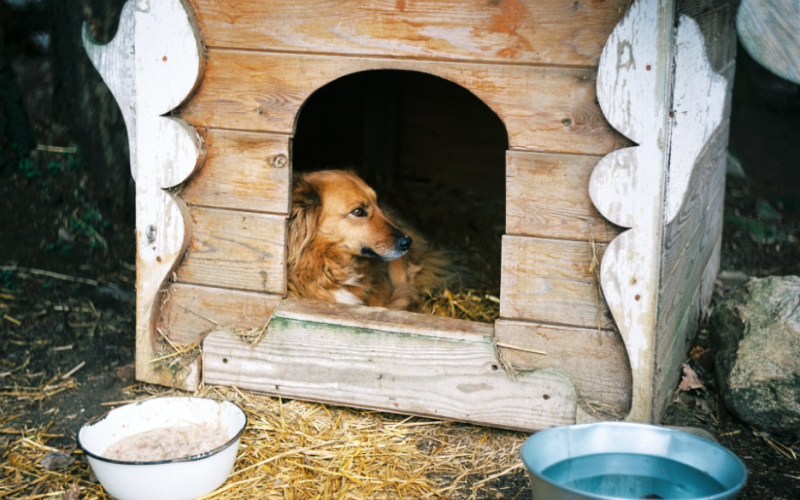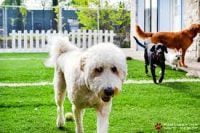Kennel Cough In Dogs
The defining sign of an infectious condition known as kennel cough is a dry, hacking cough that sounds like something lodged in your dog’s throat. Although kennel cough is rarely fatal, it is vital to recognize the signs and have your canine pet assessed by a veterinarian as soon as possible if you suspect he or she has it. Continue to read what is kennel cough and how it spreads?

Kennel Cough Sound
Kennel Cough is a term used to describe a cough in kennels.The ailment affects the lungs. Kennel cough, also known as canine infectious tracheobronchitis, is a common diagnosis in dogs. Bordetella bronchiectasis bacteria and canine parainfluenza virus damage the lining of a dog’s respiratory tract, causing kennel cough.
The upper airway of a dog might become irritated and inflamed due to this. While this ailment isn’t life-threatening in most otherwise healthy dogs, it can cause more serious secondary infections in dogs with a compromised immune system, pups, and senior dogs.
Kennel cough gets its name from the extremely contagious nature of the illness, which causes it to spread quickly in settings where pets are in close quarters, such as kennels, multi-dog homes, and dog parks.
Who is susceptible to kennel cough?
“Kennel cough” can be caused by a variety of pathogenic organisms. Bordetella bacteria, parvovirus, canine adenovirus, mycoplasma, and various other viral and bacterial species can cause respiratory problems in dogs.
Because it is often the most prevalent bacterial agent involved, “kennel cough” is known as ” Bordetella.” In the vast majority of cases, several pathogens are present. The dog, for example, has a virus and is exposed to microorganisms like bordetella.
A large percentage of all dogs will be exposed to a “doggie cold” at some point throughout their lives, and the majority of those dogs will exhibit symptoms for at least a short time.
At the dog park, on a walk, anytime they have nose-to-nose contact with another dog, during a visit to their veterinarian, or after boarding at a dog kennel or pound, dogs can be exposed to a variety of pathogenic germs. Think about the last time you got a cold. It could have happened anywhere, but certain regions are more germ-infested than others.
Signs of Kennel Cough
Older, very young, unvaccinated, immune-compromised, or rarely (if ever) exposed to other dogs are at the biggest risk of acquiring a respiratory infection, with more severe symptoms.
The following are symptoms of “kennel cough”:
- Cough that does not go away
- Watery nasal discharge
- Low-grade fever and decreased activity level
- Appetite loss (in rare cases)
- Laziness (more severe cases)
- Breathing problems (more severe cases likely with pneumonia)
Symptoms normally develop three to four days after exposure, but they might take ten days. In most cases, full recovery takes 2-6 weeks; however, symptoms in “at-risk” dogs may remain longer if the sickness has progressed to a more severe stage.
What is the treatment?
The viruses implicated have no particular therapy. Any medicine will not kill them, so they must complete their course, which might take two to three weeks. Antibiotics are effective against the germs implicated, albeit some antibiotic resistance has developed. Antibiotics can also help prevent subsequent bacterial infections caused by virus-induced immune system suppression. Cough suppressants are used to stop the coughing cycle from repeating. In difficult situations, anti-inflammatory drugs may be required to reduce discomfort by reducing inflammation of the trachea.
How can I keep my dog safe from “kennel cough”?
The only definite method to keep your dog safe from “kennel cough” is to keep him away from other dogs. However, because responsible dog owners vaccinate their dogs, the dog will need to visit the veterinarian regularly and will very certainly encounter other dogs. “How can I completely prevent my dog from becoming ill over its lifetime?” is like asking, “How can I completely prevent my child from becoming ill?”
Vaccinating your dog regularly is the greatest approach to help him from “kennel cough.” Your veterinarian may be able to provide you with a vaccination that can help prevent or minimize the severity of “kennel cough” in some circumstances. If you are very worried about keeping your dog safe, consider building a dog kennel at home. If you have the means to do so this is a great way to add an extra layer of protection for your dog.
Because bordetella bacterium is frequently connected with a canine respiratory infection, it is generally known as the “bordetella” vaccination. While this vaccine is only 40-60% effective in clinical trials, it is the greatest option for keeping your dog healthy when combined with other immunizations.
Is it Possible to Treat Kennel Cough in Dogs at Home?
There are a few at-home remedies for minor episodes of kennel cough. Keep an eye out for indicators that the kennel cough worsens or fails to improve.
Warm water with honey
One-half spoonful to one tablespoon honey combined with a little warm water in a bowl can be given to your dog. Depending on how often your dog coughs, you can give this up to three times daily.
Use a humidifier
While your dog is sleeping, a tiny humidifier may be placed near them. The humidifier will provide moisture to the air your dog breaths, aiding with respiratory inflammation.
Use Steam Therapy in Your Shower
Allow your dog to stay in the locked bathroom with you while you take a hot shower or bath, but not in the shower or bath. The steam treatment provided by a hot shower might also assist in reducing inflammation.
Ensure that your dog is getting proper rest
While your dog is healing from kennel cough, he must get enough rest and try to minimize the amount of exercise. This will aid healing and prevent coughing fits.
Conclusion
Avoid irritants like household cleaners, cigarette smoke, and dust while your dog is healing from kennel cough at home. These items might irritate your dog and delay his rehabilitation. If these irritants are commonly in your home, introduce an air purifier.
Consider using a harness instead of a collar while taking your dog outside. The harness will allow you to take your dog on a walk without putting strain on their trachea, which might aggravate their cough.
Sources:
https://vcahospitals.com/know-your-pet/kennel-cough-or-tracheobronchitis-in-dogs
https://www.articleinsider.com/how-to-build-a-dog-kennel/
https://www.ocpetinfo.com/education-resources/animal-disease-information/bordetella










